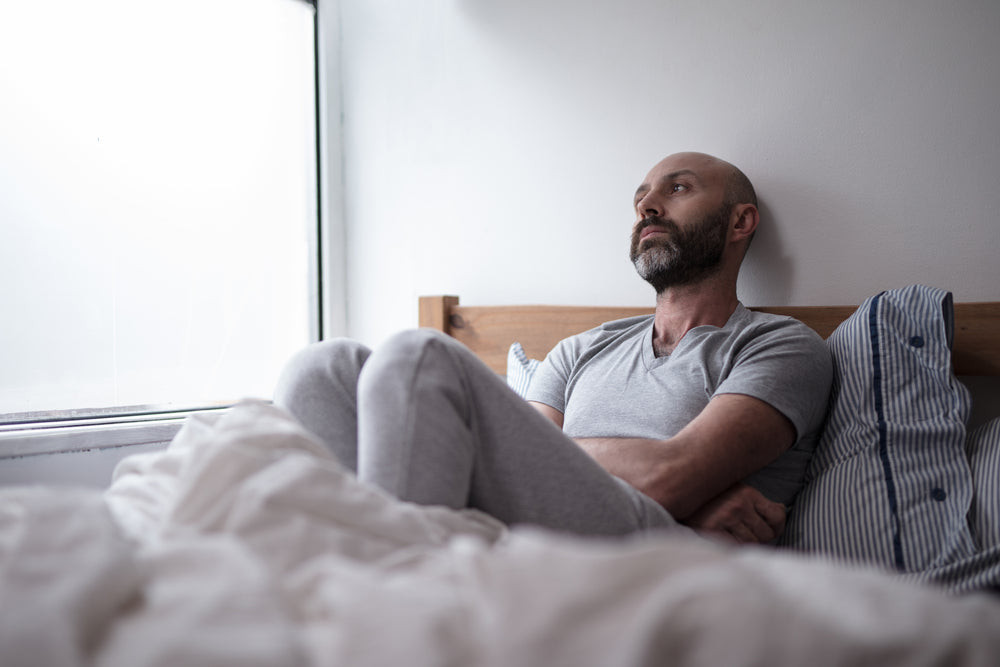Free U.S. Shipping On Orders Over $150

How Sleep Affects Your Mental Health - And Vice Versa
Posted on
To be honest, it’s kinda annoying how much sleep affects almost every aspect of our bodies. Miss a couple hours of sleep and you’ll spend the day feeling lethargic, unfocused and even hungrier.
Poor sleep quality can be especially bad for your mental health. Irritation, increased stress, mood swings — all these are classic symptoms of sleep deprivation. Prolonged sleep deprivation can result in more severe and chronic mental health issues like depression.
How (and Why) Sleep Affects Your Mental Health
Most of our mental health happens in our brains. That's where neurons and other structures trigger and process emotions.
Sleep is extremely important for brain health. When you sleep, your brain gets time to recover and clear out waste build-up. But there’s a ton of other stuff that happens in your brain when you snooze, as we discussed in our sleep stages blog post.
In some sleep stages, the brain is almost as active as when you are awake. It’s busy consolidating memories, dreaming, creating new connections and so on.
We don’t fully know exactly what happens in the brain during sleep, but we know it’s important for our mental health. That’s why even getting an hour less of sleep than usual can throw you off kilter the next day in terms of focus, moods, and mental performance.
Short Term Mental Health Effects of Sleep Deprivation
If you don't get enough sleep for one or two nights, you’ll feel it in your head during the day. Sleep deprivation negatively affects emotions, learning and memory among other mental processes.
So you’ll find yourself struggling to grasp a new concept in class, forgetting something your boss told you, or being unable to concentrate on a task. Emotionally, you will feel more anxious, things will stress you more easily and you may tend to be more irritable towards people around you.
The good news is that these symptoms fade away once you have cleared your sleep debt. A couple nights of good sleep and you bounce back to your normal self.
If, however, you keep sleeping poorly, your mental health will suffer in more serious ways.
How Sleep Affects Mental Health in the Long Term
With chronic sleep deprivation, all the short term issues we’ve described above add up. So over time, you can develop chronic stress, serious memory problems and poor overall mental performance.
Poor sleep has been linked to various psychological disorders including anxiety, depression, suicide ideation and panic attacks. You are especially vulnerable if you already suffer from a mental health problem. Lack of sleep can worsen any symptoms you are experiencing.
How Your Mental Health Affects Your Sleep Quality
Sleep and mental health have the same kind of relationship as sleep and exercise — they are bidirectional. That is, they affect each other.
So sleep can cause mental health problems. Existing mental issues can also cause poor sleep. Often, it turns into a vicious circle. You sleep poorly, which aggravates your mental health, which worsens your sleep, which further worsens your mental health and so on.
Stress is one of the most common mental health problems and it can really mess up with your sleep. It’s a major contributor to insomnia.
Depression, anxiety, low self esteem, seasonal affective disorder, bipolar disorder and other issues can also make it harder to get good quality sleep.
What To Do?
So how do you get out of this vicious circle?
The first step is to consult a doctor or psychiatrist if you have a serious mental health problem that’s affecting your day to day life. Therapy and/or medication can make it easier to improve your mental health and sleep quality.
For most people, the best thing is to try and improve both their sleep quality and mental health at the same time. Luckily, both involve many of the same solutions.
For example, being more active (walking, running, sports, gym etc.) can significantly make you less stressed or anxious while also helping you sleep better. The same is true for yoga, meditation, breathing exercises and spending time in nature.
Establish a healthy sleep routine and stick to it. Turn off your gadgets an hour or two before bedtime and go to bed at the same time everyday.
Turn your bedroom into a calm, quiet, cool and relaxing sanctuary. This is good for your mental health and sleep.
As your sleep improves, you’ll notice your mental health also getting better.
Quick links
Contact
6063 Hudson Road #160
Woodbury, MN 55125
Yo@hercLeon.com
Leave a comment: